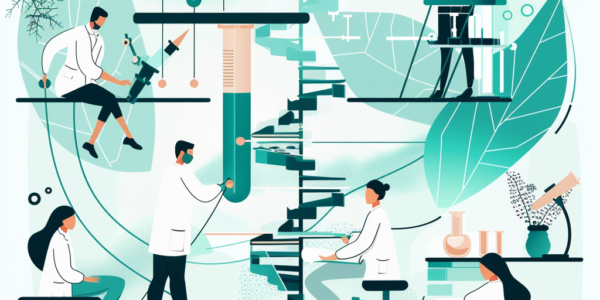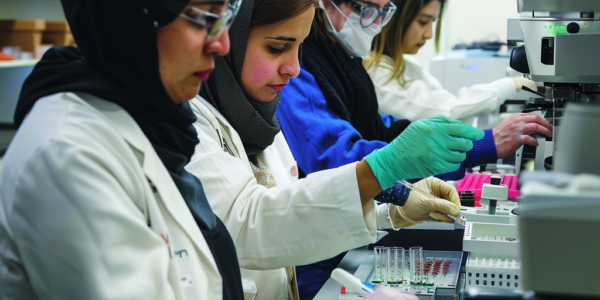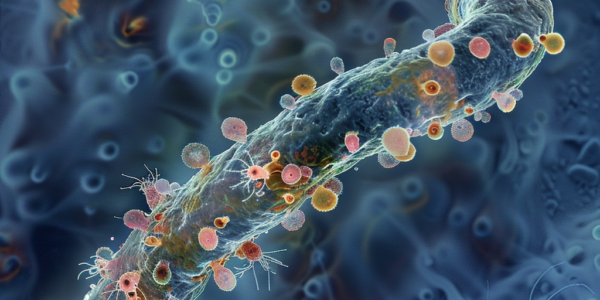Breakthrough in Mapping Mojave Poppy Bee Genome
Researchers have achieved a significant breakthrough in understanding the genetic makeup of the Mojave poppy bee, a crucial pollinator in the eastern Mojave Desert. The ‘Beenome100’ project successfully mapped the genome of Perdita meconis, a species known for thriving in drought conditions. This achievement aims to provide insights into how genetic variations impact bee resilience to environmental changes, aiding in conservation efforts and sustainable bee management.
Ancient Plasmodium Genomes Shed Light on History of Human Malaria
Ancient Plasmodium genomes shed new light on the history of human malaria, revealing insights into the origins and spread of the disease. The study utilized high-coverage ancient genome-wide data spanning 5,500 years, showing early presence of P. vivax and P. falciparum in Eurasia. European colonizers likely brought P. vivax to the Americas, while the slave trade introduced P. falciparum. Surprisingly, P. falciparum was found in the high-altitude Himalayas, challenging previous assumptions. This research paves the way for palaeo-epidemiological studies, offering valuable insights into the historical impact of Plasmodium parasites.
Fern with Largest Genome Shatters World Records
Discover the remarkable fern on New Caledonia with the largest genome ever recorded, surpassing even Big Ben in size. Scientists are fascinated by how this ancient plant thrives with 160 billion base pairs of DNA, 50 times larger than the human genome. Learn more about this groundbreaking discovery and its implications for the plant kingdom.
Study Links rDNA Copy Number to Inflammation and Disease Risk
A recent study by Queen Mary University of London found a strong association between ribosomal DNA (rDNA) copy number and the risk of inflammation and diseases. The research, analyzing samples from 500,000 individuals, highlights the potential of rDNA analysis in identifying genetic predispositions to various health issues. The findings suggest that a broader genome analysis could lead to early disease detection and innovative treatment approaches, emphasizing the importance of leveraging biobanks for improved healthcare outcomes.
Genetic Basis of PTSD Uncovered in Groundbreaking Study
A recent study published in Nature Genetics has identified 95 risk loci associated with PTSD, 80 of which were previously unknown. By pinpointing potential causal genes related to various biological processes, this research enhances our understanding of the neurobiological mechanisms underlying PTSD and opens up opportunities for targeted interventions and personalized treatment strategies.
UC Irvine Develops First Genetic Reference Maps for Short DNA Repeats Linked to Over 50 Fatal Human Diseases
University of California, Irvine has developed genetic reference maps for short DNA repeats linked to over 50 fatal human diseases, such as amyotrophic lateral sclerosis, Huntington’s disease, and various cancers. The UC Irvine Tandem Genome Aggregation Database provides a platform for researchers to explore the connection between these mutations and diseases, ultimately enhancing clinical diagnostics and understanding health disparities.
AI’s Exploration of the ‘Dark Genome’ and Its Impact on Cancer Research
AI has made significant strides in cancer research by delving into the ‘dark genome’ to revolutionize our understanding of cancer and pave the way for more effective treatments. By analyzing non-coding DNA sequences with AI technology, researchers can identify potential therapeutic targets and uncover novel biomarkers for early cancer detection. This intersection of AI and the ‘dark genome’ represents a paradigm shift in cancer research, offering unprecedented opportunities to unravel the complexities of cancer biology and transform the landscape of oncology.
Advancements in In Vivo Gene Editing for CRISPR-Based Therapies
Explore the latest advancements in CRISPR gene editing technology, including in vivo delivery of gene-editing therapies and improved manufacturing to reduce the cost of treatments. Learn about the innovative methods being developed by Nobel Laureate Jennifer Doudna and her team at the Innovative Genomics Institute to target specific cells within the body for more accessible and affordable CRISPR-based therapies.
First DNA study of ancient Eastern Arabia reveals resistance to malaria
The first DNA study of the ancient population of Eastern Arabia has revealed that people developed resistance to malaria following the appearance of agriculture in the region around five thousand years ago. The study also provides unprecedented insights into human history and disease progression in the region, shedding light on the ancestry of ancient populations and the prevalence of the malaria-protective G6PD Mediterranean mutation. The research, published in Cell Genomics, involved experts from multiple universities and research centers.
Genomes of extremophiles contain information about their extreme environments
Organisms living in extreme environments have genomes that contain information about the type of environment they thrive in, according to research by the University of Waterloo and Western University. This discovery could lead to a better understanding of how organisms adapt to harsh conditions and potential applications in biotechnology and astrobiology.










